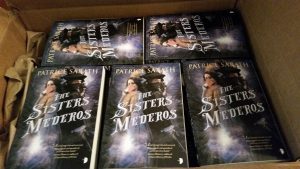Patrice Sarath's Blog, page 11
March 22, 2018
FollyCon Program(me)
I am looking forward to FollyCon in Harrogate on March 30-April 2. This will be my second Eastercon and I’m so excited! Angry Robot is having a launch party for The Sisters Mederos and Jeff Noon’s The Body Library, his sequel to A Man of Shadows. If you are going to the con, I hope you can make it to the launch party.
Angry Robot Launch Party
Sunday 15:00 – 16:15, Ballroom Stage End (Majestic Hotel)
We’re not actually going to launch an angry robot, Elon Musk-style. This is a chance to meet writers and editors from Angry Robot books, and drink will also be available.
Penny Reeve (Angry Robot), Jeff Noon, Patrice Sarath
I am also going to be on the following panel. I’m looking forward to it — it’s not going to be an easy conversation, but it’s a necessary one.
TWP to #MeToo
Saturday 15:00 – 16:15, Reading Room (Majestic Hotel) Since the 1980s, the collaborative members-only fanzine The Women’s Periodical has provided a space for women in fandom to share their experiences. As #MeToo shows, women’s voices still need to be heard, inside and outside fandom. What’s changed? What’s to be done next?
Kari (M), Patrice Sarath, Caroline Mersey, Christina Lake, Marianne Cain
I’ve never been to Harrogate before, and I’m hoping to take advantage of the walking tour the convention is hosting. I’m a Heyer fan, and Harrogate is one of her settings, and I’ve been to Bath and Brighton, so why not Harrogate? I’m rooming with the fabulous Rosanne Rabinowitz (author of Helen’s Story, which made the shortlist for the Shirley Jackson award). I’m looking forward to meeting my Angry Robot team in person, and various other friends whom I’ve met only online at this point (Hi Kari!).
I can’t wait.
March 12, 2018
The Sisters Mederos and a theory of magic
The reviews are coming out about A Wrinkle in Time, and they made me think about The Sisters Mederos. Not just, “damn, I wish I could write a world-changing novel or best-seller and have it turned into a movie,” but more specifically, special effects. Or, as we fantasy writers call it, magic.
I am one of those authors who writes fantasy but who doesn’t do magic. The magic in my books is scaled back and subtle and doesn’t take center stage. My fantasy novels are specifically about the intersection of magic with our world (Gordath Wood), or about an alternate or secondary world much like our own, which has certain magical elements in it (The Sisters Mederos). And then the magic sits there and does its thing, percolating or humming or informing the world and the characters who interact with their environment, and it doesn’t call attention to itself. It’s like weather. Well, not even weather. It’s like air.
A Wrinkle in Time, for all that it is a time- and space-traveling science fiction story, is magical in exactly that way. The Mrs are magical and very powerful gods, and they can perform amazing acts of science and magic, but A Wrinkle in Time is about Meg and Charles and Calvin and Meg’s mom and dad. The most chilling scene in A Wrinkle in Time is when all the kids are bouncing their balls in front of their houses in rhythm, and the reason it’s chilling and powerful is because the children see it and they see how wrong and horrifying it is. This has nothing to do with FX and everything to do with story telling.
Yet as soon as I saw the trailer, I could see that the fabulous Ava Duvernay had decided to focus on the magic and not the story. To try to make the magic in our minds real in front of our eyes. But every story teller knows, the most powerful magical bond is between the reader and the book — and it’s the bond the reader creates, not the author. Duvernay went the exact wrong way.*
True confession: I haven’t seen the movie yet. I’m sure it’s marvellous. I have already heard, however, reviews that confirm that it’s kind of … cold. Soulless. As the saying goes, this is a book about the ineffable, and they effed with it.
In contrast, take a look at The Fellowship of the Ring. The LotR was widely considered to be unfilmable. With Fellowship, Peter Jackson created Middle Earth that brimmed with magic and yet the magic was just there, humming along under the surface, the land steeping in it. Characters interacted with their environment, both magical and mundane, in equal measure, as if the magic itself was mundane. The FX weren’t overlaid on top in a “look at me!” way as the special effects were in later installments. I have all the movies on DVD, but The Fellowship is the only one I rewatch.
Magic as mundane. I think that’s what I mean by the kind of magic I do. Not that the magic is ho-hum — it’s not — or that it’s not very magical, but just that it doesn’t call attention to itself. It might even, as in The Sisters Mederos, exist ambiguously, just as magic does in our world.
I know that this theory is not to everyone’s taste. I love fantasy, but I’m not in it for the magic system. When I read a good science fiction or fantasy novel, I want to sink into the world and be immersed in the story. Same with the movie — I don’t want to constantly be noticing the special effects. After all, when it comes right down to it, the real special effects happen between the reader’s ears. The director — or the author — interferes with that magic at his or her peril.
*The last time Hollywood tried to film A Wrinkle in Time, the same thing happened. I think it’s a case of, well, we have all these cool toys…
The Sisters Mederos comes out in a few weeks, readers! Here’s a box of books and a few buy links:
February 26, 2018
Goodreads giveaway for The Sisters Mederos
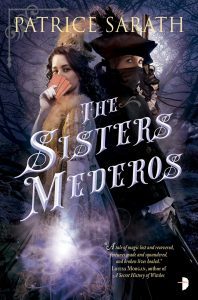
Let the adventures begin…
For all your Sisters Mederos needs: Sign up now for the Goodreads giveaway.
10 Reasons Why:
In these dark times, sisters kicking butt and taking names can inspire us all to do what’s right.
Conversely, when you need a comfort read, hot coffee, and biscuits as high as the gunwales, The Sisters got you covered.
Who doesn’t like a comeback story with derring-do, cross-dressing, and hidden powers?
Evil headmistresses abound. Well, really there’s only one, but she outkicks her coverage in the evil department.
Two words: muckraking journalism
Duels of wits, masked balls, irresponsible new friends, a sweet love interest, and did we mention inconvenient powers?
Uncle Samwell. At first comic relief, and so much more.
A smuggler’s lair, daring escapes, and a wicked employer.
Two housemaids who are not who they seem, a governess with a side hustle, a cross-dressing mistress, an arranged marriage, and unexpected allies.
And finally, how can you resist? “House Mederos was once the wealthiest merchant family in Port Saint Frey. Now the family is disgraced, impoverished, and humbled by the powerful Merchants Guild. Daughters Yvienne and Tesara Mederos are determined to uncover who was behind their family’s downfall and get revenge. But Tesara has a secret – could it have been her wild magic that caused the storm that destroyed the family’s merchant fleet? The sisters’ schemes quickly get out of hand – gambling is one thing, but robbing people is another…”
February 10, 2018
A Visitor’s Guide to Port Saint Frey
Welcome to Port Saint Frey, also known as the Jewel of the Ravenne Protectorate. Whether you’ve come to visit or to participate in the lifeblood of commerce in our fair city, you are welcome here. We hope this small guide will make your visit or your business more pleasant and fruitful.
Lodgings
Our distinguished guests will find luxurious accommodations at the Bailet Hotel. This fine institution is located on the Esplanade, overlooking the marketplace and the harbor, with views throughout the entire city from the rooms on the top floor. The Bailet has been thoroughly modernized with camphene lamps and a boiler in the basement that allows for en suite baths. For our more frugal guests, basins are available in each room for ablutions. WC on every floor.
Sailors are obliged to stay at the seafarer hostels on the harbor where they will be most comfortable.
Dining
There is no establishment like Alastra’s Restaurant for fine dining. Located on the Esplanade off Emery Place, this elegant restaurant specializes in fruits of the sea, oyster stew, and the world famous captain’s dinner, with biscuits as high as the gunwales, as the saying goes.
There are also many tea shops for the ladies and those with smaller appetites and leaner purses, and congenial taverns for those who wish to experience the famed hospitality of the city.
For the adventurous, try the cuisine along the waterfront, where the spicier dishes that cater to those captains and sailors who have grown accustomed to more unusual dishes on their voyages. Cuisine from Qin, the Cape, and the Eastern countries are abundant. Beware the chilies in the sauces purveyed by the street vendors! They are not for the faint of heart or sensitive of palate.
In recent years the Chahoki cuisine of the Eastern empire has made its way to Port Saint Frey. Legumes, maize, grain, venison and coney and black beer are the best Chahoki food west of the White Desert.
Shopping
Our ladies will tell you, the Mile is the best for shopping. Sturridges has been delighting for thirty years with just the right present for a friend or loved one — or for a business partner one especially wants to impress. Off the Mile is Dressmaker’s Row, where our ladies are adorned in the latest fashions by seamstresses of the hautest couture. There are a surfeit of small shops for those sundries the ladies are always out of — bonnets and gloves and slippers and ribbons, etc.
Mercantile Row is less fashionable, but there our city shops for the goods of a less rarified nature — there you will find bookstores, general stores, and purveyors of durable goods. Many a determined shopper has found bargains in these more modest surroundings that reward the hunt.
The Business of Port Saint Frey
We are a busy merchant city, and look forward to becoming partners will all good merchants wherever they hail from. You will find a Merchant Guild most interested in your proposals. Please note that no business arrangements may be made with any merchant in the Guild without the Guild’s approval. Please visit Guild Headquarters for an introduction. It is conveniently located on the Esplanade right next to the Bank of Port Saint Frey.
Please note: In years past, enterprising men of commerce have sought to bypass these regulations by going directly to Aether’s Coffee House to make arrangements with the Names. The Guild takes a dim view of such activities. This guide advises against it.
Harbor Rights
Captains and owners must visit the Guild headquarters to apply for Harbor Rights. Application fees are 2,500 guilders, no exceptions. Ships without harbor rights must anchor out past Nag’s Point until approved.
Safety
Common sense is its own reward. Men of means who wish to do business in the city, would do well to hire locals who can help them steer wide of dangerous shoals. This means those individuals whose emoluments come from understanding which sticky wheels to grease, to those individuals who can appear intimidating.
The Port Saint Frey Constabulary advises all newcomers to the city to stay away from the harbor after dark. As the Chief Constable says, “Don’t bring trouble down on yourself.”
Note: While the exploits of the Gentleman Bandit sell newspapers, the Merchant’s Guild has no official word on this brigand, were he to exist. Which we don’t think he does. But in case he did, we don’t talk about him.
Enjoy your stay!
January 29, 2018
The Sisters Mederos is the book I wanted to read
One of the coolest things about being a writer is that you are never more than your fingertips away from a story that you want to read. I’m the most successful as a novelist when I write the stories that I want to hear. For example: Can I ride a pony through the woods into another world? Voila, Gordath Wood.
Or the question that was the impetus behind The Unexpected Miss Bennet: Why didn’t Mary and Mr. Collins get married?
When I started writing what became The Sisters Mederos, I knew I wanted a Regency-inspired fantasy novel with my signature brand of magic (just a hint, and the kind of magic that you don’t quite know if it’s real or not). I didn’t know that there were going to be cross-dressing bandits, dastardly captains of industry, cutthroat gamblers, and ballroom politics. I just knew I wanted to read a ripping yarn, so I had to tell it to myself first.
Note: This might be why I don’t (or can’t) outline. If I know what’s going to happen, it takes all the fun out of it.
Here’s an excerpt, just to whet your appetite:
The clerk looked up at Yvienne’s entrance and rolled her eyes.
“Miss Mederos,” she said starchily, for all that she was Yvienne’s age or even younger. “Really, we can’t continue on like this.”
Yvienne was peripherally aware of a personage in plain rough clothing and a deep poke bonnet sitting on the bench by the door.
“Miss Mastrini, please. It won’t happen again, I promise,” she said.
“Heather Moon said that your uncle was lewd and unbecoming.”
Yes. That was Uncle all right. She looked the clerk straight in the eye.
“I’ll make him stop,” she said. Her declaration was met with the clerk’s skeptical demeanor. “Please,” she added, desperate. It wasn’t that she and Tesara couldn’t do the work. They had been thoroughly trained in the scullery arts at Madam Callier’s. But it would kill her parents if their daughters, their hopes for the future, would be reduced to scrubbing floors.
The girl sighed. “I suppose I can see who we have.” She said it with the air of someone who didn’t think it would do any good.
Yvienne reached into her small purse and handed her a folded paper, meticulously written out. “I’d also like to give you this.”
The girl scanned it and raised an eyebrow. “You wish to be a governess?”
“I think my qualifications will suit.”
Her vitae were woefully short, but she had learned something in spite of all of Madam Callier’s efforts. And she could hardly do worse than the average governess.
“Do you have any letters of reference?” Miss Mastrini asked.
“No.”
“Well then, I’m afraid–”
“Miss Mastrini, they all know me. They know my family, they know my situation, they know everything about me, including that I’m desperate, poor, and the smartest girl in Port Saint Frey. Surely there’s someone who is looking for a governess for their girls who knows they can trust one of their own – even one such as me.”
The room was silent. She was deeply ashamed that the person on the bench had to hear her plea. Miss Mastrini pursed her lips and then came to a sudden decision. She smoothed out the resume and stamped it with a red ink stamp. Approved, Yvienne read upside down. The young woman dated it and scrawled her signature.
“I won’t have something for you right away,” she said. “It might take a few days. I’ll send you a letter if we do find an engagement.”
Yvienne wanted to clasp her hand gratefully, but she settled for heartfelt thanks. “Thank you. Thank you so much.”
“Now, as for your housemaid situation, unfortunately–”
The woman on the bench stood and Yvienne turned around. “Miss Mastrini,” she said in a firm, clear voice. “Perhaps I would be a good fit for this household.”
“Miss Angelus, we haven’t even taken your vitae,” Miss Mastrini objected. “And believe me, a different posting would be better for you.”
What an extraordinary name. Yvienne watched as Miss Angelus untied her old-fashioned bonnet and took it off, allowing them to get a good look at her. She was a tall, broad-shouldered girl, built for work, as Cook might say from the old days. She was not a young girl, but she was not old, being perhaps in her eight-and-twentieth year, or thereabouts. She was not beautiful but striking, with full lips, dark hair, and dark eyes under dramatic brows. In other words, Uncle Samwell would soon be lewd and unbecoming yet again. She felt a pang of disappointment.
“Let me introduce myself,” Miss Angelus said. “My name is Mathilde Angelus. I am twenty-seven years old, and I’ve been working in a kitchen and a domestic situation my whole life. I can cook dinner parties for two dozen and breakfast for the family. I’m clean, neat, and particular, and I can housemaid and nanny. I’m new here in Port Saint Frey because my family has moved from Ravenne and it is up to me to help my mother and father as they make a new life away from the mines. I’m not married, I don’t hope to be, and if your uncle tries anything on with me he’ll be very sorry. I don’t run from a lewd man, but I don’t suffer them neither — either.”
Silence rang in the tiny office, broken only by the ticking of the carriage clock on the mantel behind Miss Mastrini.
“Lovely,” Yvienne said, when she could break the spell of wonder and admiration. “When can you start?”
Just about three more months, people! I know I can’t wait. And then we can talk about The Sisters Mederos together.
January 16, 2018
The Sisters Mederos featured on Barnes & Noble’s SFF blog
Behold…the cover! The Sisters Mederos is featured on Barnes & Noble’s SFF blog. You can read the prologue and the first chapter, and see what all the fuss is about.
But first feast your eyes on the glory that is the cover.
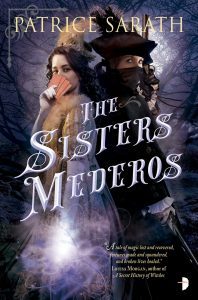
Tesara and Yvienne Mederos — prim, impoverished merchant daughters by day, but by night…
January 9, 2018
The Sisters Mederos in good company
On the Barnes & Noble blog:
95 Books Sci-Fi & Fantasy Editors Can’t Wait for You to Read in 2018
I am in very good company.
Mood: Pleased
December 20, 2017
Julie Weissbaum, is that you?
Note: I wrote this story when The Force Awakens came out. I was reminded of it when The Last Jedi opened. I have a feeling I’ll be reposting this in a few months when the Han Solo movie makes its entrance. Sometimes the past hurts, but who doesn’t want to be 8 years old again and enthralled by a fictional world?

Shamelessly lifted from NASA’s Hubble page.
The minute Bryce saw the girl at Andy’s party, she reminded him of someone, but he couldn’t think of who. She had full red lips, horn-rimmed glasses, big boobs filling out her Galaxy Force T-shirt, a polka dot skirt, tights, and chunky boots. The T-shirt was the one with Bram and Mikala on it, the one that all the girls wore, and by that Bryce knew the girl wasn’t even worth quizzing on her geek bona fides. She was perched on the edge of a long sectional sofa at one end of the living room, and he, Tim, and Andy were all at the other end, near the hall. It was crowded, the buzz of conversation rising over and falling under the game noise from a bunch of people playing their hearts out on Rock Band.
He turned back to Tim and Andy. Tim was going on.
“The first thing I thought was, this wasn’t for me,” Tim was saying. “I get that director is the new it boy in Hollywood, but once he got his hands on it, I knew he was going to sex it up. All those new characters — like, who cares? Diversity, blah — how about a good story? I’m there to see Bram, the Hunter-Killers, and the Gradiant wormhole drivers. As soon as I saw the trailer, I knew how it was going to be — fucking studio would rape my childhood.”
That’s who the girl reminded him of — Julie. They were friends in elementary school. He and Julie were in a gang of kids who ran around at recess playing Galaxy Force, making pew pew noises and fighting the Hunter-Killers with their Inspirare powers.
Tim again: “I was like, did they even watch the original movies?”
Was it Julie? That would be cool — weird, he corrected himself. Just weird. They stopped being friends in middle school and didn’t talk in high school at all. He’d heard she went on to do cool stuff. He turned around to look, just in time to see the girl laugh at something another girl was saying. For a second Tim’s drone stopped, and he could hear their conversation.
“…liked how they connected the pulsing of the quasar to a message from the Inspirare.”
“A pulsing beacon in a dark time,” the Julie-girl agreed. “They were saying that kind actions reverberate down through the universe and turn into powerful energy. I liked how Jess tapped into that at the end, that the energy from Bram and Mikala’s sacrifice a hundred years ago was what gave his Inspirare force the right amount of power to crush the last Hunter-Killer.”
Sensing competition, Tim raised his voice. “They couldn’t get the door sounds right, and what was the point of redoing the insignia on the Hunter-Killer uniforms? It was like they changed stuff up just to change it. And come on, was there any reason for Jess to be black?”
Bryce rolled his eyes. Tim didn’t see it, but she did, and she gave him a conspiratorial wink. Bryce turned his back with a jerk, sloshing his Coke, but not before he saw her bright expression, her friendly smile, inviting him in to join their conversation. God, he was tempted.
Tim pressed on louder, now that he knew they were all looking at him. “The whole Inspirare explanation was so tortured too. If you’ve seen any of the Extended Mythos universe, you’d know all that, so why pander to newbies? That’s all it was — just a way to give a bunch of people who don’t know anything about the original movies a way to feel like they’re part of something too.”
If the Julie-girl and her friends recognized the challenge, they didn’t take it, moving over to the PS3.
“Bryce,” Tim said, scorn in his voice. Bryce looked at him. Tim raised an eyebrow. “Her?”
Rage boiled over. Bryce set down his sickly sweet Coke. “Fuck you, Tim,” he said. “Door sounds? Door sounds?”
“What? What crawled up your ass?”
#
Bryce drove home, seething. Fuck you, Tim, he thought again. Not for the first time, he realized. Tim was an asshole. Yeah, they liked the same things and they worked in the same industry, and they ran in the same circles but …
I’ve spent too many years letting that be a basis for a friendship.
Had it been her? Julie was cool. Had been cool. They had been friends. They hadn’t just run with the same gang. She came over to his house. They were what, eight? They played with his Galaxy Force action figures. His dad and his brothers teased him about his girlfriend, so after a couple of times he didn’t play with her at the house, but they had remained friends.
Had they?
He remembered telling her that she couldn’t come over any more. It was all kind of confusing, because her expression got mixed up with the face of the girl at the party, but a gut-wrenching punch of shame hit him when he remembered telling his best friend that she couldn’t play with him anymore.
#
His apartment was quiet and empty. He flicked on the hall light, and his tableau of Bram, Mikala, Atoma, and Hunter-Killer action figures greeted him from a small alcove. These were the same action figures he and Julie used to play with. They were chipped and messed up, far from mint, but they were comforting and familiar. They brought an unwilling smile.
“Some things don’t change,” he said out loud. Silence answered him back.
Brushing his teeth, staring at himself in the mirror, he thought about the new sequel. Tim wasn’t wrong, he admitted. They weren’t eight years old and the new movie wasn’t meant for them. It was meant for the new crop of eight-year-olds, for the ones who got the lesson of the Inspirare Force and took it to heart better than he had done. Tim was angry because he got the right message. Their movie was irrelevant; their memories didn’t matter anymore.
He and Julie hadn’t just stopped being friends in middle school. He stopped brushing his teeth. He had been sitting with two or three other outcasts in the middle school cafeteria, a frightened herd of tiny deer surrounded by lions. Julie had walked up with her tray, and she gave Bryce a desperate smile, and he saw the same things in her that he had already learned to despise in himself — pathetic eagerness, weird clothes, stupid hair, stupid food on her tray, stupid stupid stupid Galaxy Force T-shirt and he hated her for everything he was.
So he made a sixth-grade joke about her boobs.
#
Don’t do it, he told himself, even as he checked on Facebook. Don’t stalk her, man. You are fucking pathetic. There were eleven Julie Weissbaums. He went through them, ticking off the obvious no’s. Finally he was left with one. The profile was locked down tight and the picture was of a cat but he had no other choice. Even knowing that his message would get lost in the Facebook system, that there was no way she’d ever see it, he sent a friend request and typed,
Hey, it’s Bryce Olean. Was that you at Andy’s party last night?
He hit send before he lost his nerve, and then spent the rest of the night castigating himself and trying to convince himself that there was no way the message would be seen. She doesn’t want to hear from you, man. You were an asshole back in the day. She’s not even the right girl, and it doesn’t matter how much you want to apologize.
Lying in bed in the dark, only small power lights shining as bright and useless pinpoints that illuminated nothing, Bryce stared up at the ceiling. He remembered when Bram first learned about the Inspirare Force from Atoma, the wise mentor:
“Do you think only great deeds have the power to fight darkness? Not so. Helping hand at the right time can do more to save the world than all the great deeds in the galaxy. Hero without kindness is Hunter-Killer. But hero who sacrifices for what is right and good can change the universe.”
Bryce woke with a jerk. He had been dreaming so vividly he thought he was back in his childhood bedroom, curled up in his small bunkbed with his Galaxy Force bedspread crumpled over him. He breathed hard, trying to remember where he was, eyes tight shut to hold onto the memory. A light pulsed steadily against his closed eyes, and he opened them reluctantly.
Silent, steady, the message light on his phone blinked on and off, on and off.
The End
@Copyright Patrice Sarath 2016
December 12, 2017
The Sisters Mederos is available for preorder
The Sisters Mederos is available for preorder! Order today and you’ll get your very own copy in your hot little hands or e-reader in April, and it will have the prettiest cover you can imagine. (I’ve seen it — I know. It’s gorgeous.)
On Amazon
On Indiebound
On Waterstones
Two sisters fight with manners, magic, and mayhem to reclaim their family’s name, in this captivating historical fantasy adventure.
House Mederos was once the wealthiest merchant family in Port Saint Frey. Now the family is disgraced, impoverished, and humbled by the powerful Merchants Guild. Daughters Yvienne and Tesara Mederos are determined to uncover who was behind their family’s downfall and get revenge. But Tesara has a secret – could it have been her wild magic that caused the storm that destroyed the family’s merchant fleet? The sisters’ schemes quickly get out of hand – gambling is one thing, but robbing people is another…
Together the sisters must trust each another to keep their secrets and save their family.
Here’s what some early readers have been saying:
“Patrice Sarath gives us a colorful Dickensian fantasy that leads the reader on an unpredictable path of murder, intrigue, and mystery, served up with her customary lively characterizations and pitch-perfect dialogue. It’s a tale of magic lost and recovered, fortunes made and squandered, and broken lives healed, all of it engineered by Yvienne and Tesara, two resourceful and delightful protagonists, in the company of some charming and often dangerous sidekicks.”
– Louisa Morgan, author of A Secret History of Witches
“Patrice Sarath takes readers on a fine, twisty adventure with two determined young women who abandon their dutiful, well mannered upbringing for drawing room gambling, dark alleys, and magic.”
– Carol Berg, author of The Sanctuary Duet and the Collegia Magica Series
“Delightful and compulsively readable account of the escapades of two strong willed sisters determined to restore their rightful place though disreputable means.”
– Tina Connolly, Nebula-nominated author of Ironskin
“I loved the determination of the Sisters Mederos! Despite myriad setbacks, they return to the city that crushed their family a decade before, take on the corrupt guild, and bring their enemies to justice. The first chapter in a thrilling new series!”
– J Kathleen Cheney, author of The Golden City series and Nebula Award finalist
November 26, 2017
Alcott Does Austen: Is An Old Fashioned Girl based on Mansfield Park?
A poor girl goes to live in the home of a rich family. In one version, she’s a poor relation, the other, a friend. In both cases, the girl changes the lives of the wealthy family, by virtue of, well, her virtues. She is modest, kind, and caring, and her friendship transform the parents and the son.
In the above description of the setup of both An Old-Fashioned Girl (Louisa May Alcott, 1869) and Mansfield Park (Jane Austen, 1814), the similarities are arguably nothing but coincidental, but reading the books side by side shows some pretty significant parallels, while taking into account that not only are they separated by 50 years but also by the differences between upper-middle-class British culture and a less-stratified American class system. The novels are also different in theme. Alcott specialized in improving literature for children, while Austen was addressing the moral impact of slavery on a slaveholding family in England (to sum up: their moral failings cause chaos and bring shame down upon the family, and then everything is set to rights at the end). There are no similarities between the events of the novels, and there are very few one-to-one correspondences between characters, with the exception of Fanny Price in Mansfield Park, and Polly Milton in An Old-Fashioned Girl.
Despite these major differences, I think Alcott took Mansfield Park as an inspiration for a young, American audience, writing during the post-Civil War period, in which slavery and slaves would be at the forefront in the nation’s conscience. Alcott makes no mention of soldiers or veterans or post-war hardships in An Old-Fashioned Girl, likely because the book is for children. Nor does the Civil War cast a shadow over OFG the way slavery looms in MP. Nonetheless, I think she took the characters and rewrote the story from a particularly American viewpoint.
Mansfield Park
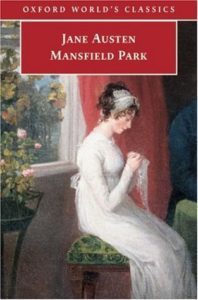 In MP, Fanny Price is taken from her impoverished home and brought up with the Bertrams (her mother is Lady Bertram’s sister).For the most part she’s made to feel inferior by the Bertrams, with the exception of cousin Edmund and her uncle Sir Thomas. Fanny’s job from a very young age is to be at the beck and call of Lady Bertram, while also serving the purpose of allowing everyone to feel self-congratulatory for their kindness to her. When the brewing dysfunction of the family finally boils over, Fanny is the one her aunt asks for, and Fanny is the daughter Sir Thomas wishes he had. Toward the end of the book, Fanny goes home to visit her family in Portsmouth. Here, the bad family dynamics of the Bertrams are compared to the bad family dynamics of the Prices, compounded by poverty of spirit, intellect, and vigor. It’s not just that the Price family are poor, they are lower class and ignorant, and portrayed as living in squalor. This part of the book goes from Austenesque to Dickensian, and it’s fascinating to see the transition, as Austen anticipates the Dickens thematic drumbeat by twenty or so years.
In MP, Fanny Price is taken from her impoverished home and brought up with the Bertrams (her mother is Lady Bertram’s sister).For the most part she’s made to feel inferior by the Bertrams, with the exception of cousin Edmund and her uncle Sir Thomas. Fanny’s job from a very young age is to be at the beck and call of Lady Bertram, while also serving the purpose of allowing everyone to feel self-congratulatory for their kindness to her. When the brewing dysfunction of the family finally boils over, Fanny is the one her aunt asks for, and Fanny is the daughter Sir Thomas wishes he had. Toward the end of the book, Fanny goes home to visit her family in Portsmouth. Here, the bad family dynamics of the Bertrams are compared to the bad family dynamics of the Prices, compounded by poverty of spirit, intellect, and vigor. It’s not just that the Price family are poor, they are lower class and ignorant, and portrayed as living in squalor. This part of the book goes from Austenesque to Dickensian, and it’s fascinating to see the transition, as Austen anticipates the Dickens thematic drumbeat by twenty or so years.
Fanny can’t stand her family any more, with the exception of her idolized older brother William, a midshipman, and her little sister Susan. She hates living in the city of Portsmouth and longs for the country. Maybe the worst thing that ever happened to Fanny was being pulled out of poverty, because during the Portsmouth scenes, it’s not a done deal that she will get to go back. And she’s terrified of that, because, even though it’s not spelled out, she might even make a decision to marry Henry Crawford, despite her moral objections, just to get the hell out of Portsmouth. Fortunately Henry runs off with Maria Rushworth, so that puts an end to that.
As I said, a very different book from OFG. So here’s what Alcott does with these same pieces.
An Old-Fashioned Girl
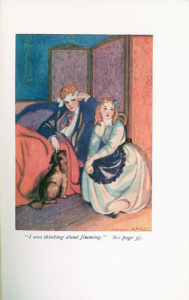 Polly Milton and Fanny Shaw meet in the country through mutual friends. This is so very American: two young teenage girls who are able to become friends despite very different stations in life and different ages. Fanny is sixteen, Polly fourteen. Polly is not an orphan– she has a large family and is close to her mother, who is as wise and noble as Marmee. She has a beloved brother Jimmy, who died in a sledding accident. She also has a brother Will, who, like Fanny’s brother William Price, is the one on whom the whole family has set their hopes. In OFG, Alcott splits the beloved brother into two, but both are motivating characters for Polly’s actions and emotions, much as William is for Fanny Price in MP.
Polly Milton and Fanny Shaw meet in the country through mutual friends. This is so very American: two young teenage girls who are able to become friends despite very different stations in life and different ages. Fanny is sixteen, Polly fourteen. Polly is not an orphan– she has a large family and is close to her mother, who is as wise and noble as Marmee. She has a beloved brother Jimmy, who died in a sledding accident. She also has a brother Will, who, like Fanny’s brother William Price, is the one on whom the whole family has set their hopes. In OFG, Alcott splits the beloved brother into two, but both are motivating characters for Polly’s actions and emotions, much as William is for Fanny Price in MP.
Polly is as different from Fanny Price in OFG as can be imagined. Fanny is shy, quiet, virtuous, and timid. Polly is outgoing, jolly, self-confident, and good. Her hearty self-sufficiency is a breath of fresh air to the Shaws. She provides a good example to everyone in the family. She is kind to the grandmamma in the attic, who has been exiled to the top floor (an echo of Fanny’s situation in MP). Mr. Shaw, who is a very busy businessman like his counterpart Sir Bertram, is wistful about Polly, because he wishes his daughter could be more like her. Polly has a few adventures, such as spending all her money on bronze boots, making molasses candy, and going sledding with the townie children. She civilizes Tom and little sister Maude, acts as Fanny Shaw’s better angel, and is wise for her age.
Most tellingly, Alcott uses Polly’s poverty to ennoble her and by extension to ennoble her readers. Unlike in MP, poverty is a virtue. Polly’s mother lets her go spend a few months with the Shaws so the lesson that money does not buy happiness will sink in. This is such an American story. It upends class, it cheerfully propagandizes poverty and self-sufficiency, and it makes a virtue out rough-hewn native intelligence.
An Old-Fashioned Girl was written in two parts. The second part takes place when Polly is eighteen. She goes to work and lives happily in a boarding-house that is cloyingly idyllic. (Even her cat and her canary are friends.). Even better though, Polly has a circle of young women friends who are doing amazing things — sculpting, painting, working for women’s suffrage, doing good, and living their best lives. Fanny Shaw comes to visit and comes away with the right lesson: being poor and creative is better than being rich any day!
Fanny gets her wish — the Shaws lose all their money, and Polly is there is save them by helping them learn how to be poor, just like Fanny Price returns to the Betrams to save her adopted family too. Once again, Alcott takes the events of MP and Americanizes them to suit her version of the story.
Also a purely American story decision — Tom Shaw goes West to seek his fortune, and comes back to marry Polly, echoes of Tom Bertram who goes to Antigua with his father to see to the sugar plantations. It’s Polly’s brother William who becomes the minister, echoing Edmund Bertram in MP.
Tom Shaw even has an engagement with a fashionable young lady who — horrors! –uses makeup. When the family loses their money, Trix breaks it off, and then everything is in place for Tom to marry Polly. Unlike Mary Crawford, Trix is barely on the page and lacks the complexity of the Austen character. Tom doesn’t even like her very much. She’s less a character than a plot point.
All the elements are there, just put together in different ways.
Conclusion
We can’t know for sure that Alcott is reconstructing Austen. I don’t think there’s any evidence except in these comparisons between the two texts. We know that Alcott read Elizabeth Gaskell, because she directly references Cranford in OFG. However, she’s not so considerate regarding Austen.
Although proof would be nice, I think the similarities between the two books are deliberate, not unconscious. They feel very intentional, even down to the echoes in the names, and how Alcott specifically does not use the same names for the same characters, or even the same plot points, She also inverts the power dynamics of the two families, another thoughtful decision. No longer does the rich family rescue the poor one (Fanny, William’s promotion, Susan’s turn as Lady Bertram’s companion). Now, it’s the rugged, vibrant, energetic poor family that comes to the rescue (Polly as guide to their new reality, Ned giving Tom a job out West). And I wonder, too, if Mansfield Park’s connection to slavery was not more recognized in 1869, since the wounds would be all the more raw. Could An Old-Fashioned Girl be an even more pointed rebuke aimed at Austen?

